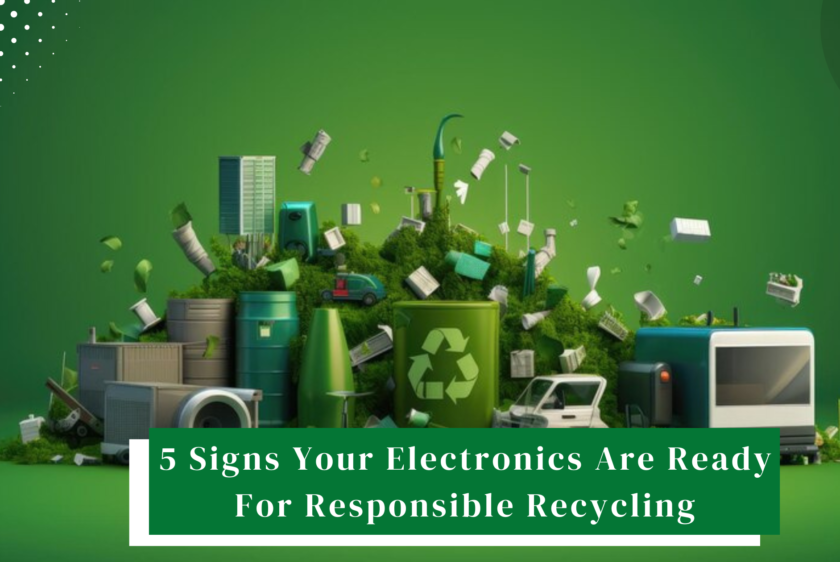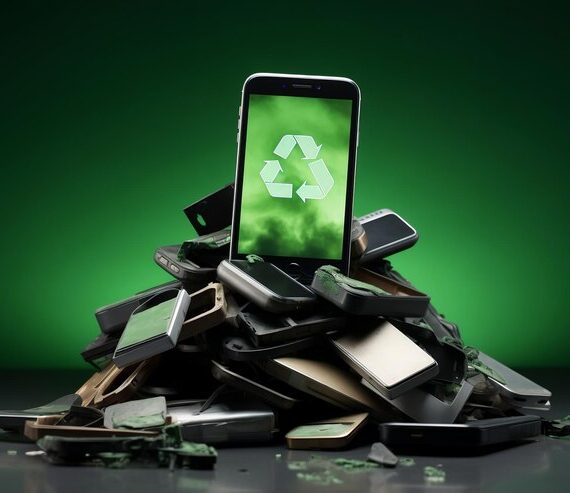
5 signs Your Electronics Are Ready for Responsible Recycling
In the digital era, electronic devices have become essential to our daily lives. Tools like laptops, tablets, mobile phones, etc., offer unparalleled convenience and connectivity. However, as technology advances, the question of what to do with our old electronics becomes more important. Responsible recycling of electronic devices is vital for securing natural resources and reducing the environmental impact of electronic waste (e-waste). In this blog, we will highlight the signs that indicate the need to recycle your electronics responsibly and provide practical tips for adopting sustainable e-waste management practices.
Discover 5 Signs that Your Electronics Require Responsible Recycling

Outdated Technology:
Rapidly changing technological innovation means that our gadgets will quickly become outdated. Upgrading to the latest models is common, but what happens to the old devices? Outdated technology often contains components that are no longer efficient and may even be incompatible with modern software updates. Instead of letting them gather dust in a drawer, it’s crucial to recognize when your electronics are outdated and ready for responsible recycling.
Actionable Tip: Research local electronic recycling programs or drop-off locations to ensure your outdated devices are properly recycled.
Physical Damage Beyond Repair:
Physical damage, such as cracked screens, broken casings, or malfunctioning components, can significantly impair the functionality of electronic devices. While minor damages can sometimes be repaired, extensive wear and tear may render the device beyond economical repair. Instead of letting these damaged electronics gather dust in a drawer, consider recycling them responsibly to reclaim valuable materials and prevent them from ending up in landfills where they pose environmental hazards.
Actionable Tip: Check with your device manufacturer or local recycling facilities for guidance on safely disposing of irreparably damaged electronics.
Slow or Inefficient Performance:
As electronic devices age, they may experience a decline in performance. Sluggish response times, frequent crashes, and inability to run updated software are indicators that your gadget is reaching the end of its functional life. Consider recycling it responsibly rather than tolerating the frustration of using a slow device.
Actionable Tip: Securely wipe your data from the device to protect your personal information before recycling. Many devices have built-in factory reset options.
Battery Issues:
Batteries play a significant part in powering many electronic devices, but they degrade over time, leading to diminished battery life and potential safety hazards. If your device frequently requires recharging, experiences unexpected shutdowns or exhibits swelling or leakage from the battery, it’s a sign that the battery has reached the end of its lifespan. Since batteries contain hazardous materials like lithium and lead, it’s essential to handle them properly through recycling programs designed to extract and dispose of batteries safely.
Actionable Tip: Some retailers and manufacturers offer battery recycling programs. Explore these options to dispose of batteries safely.
Upgrade Sustainably
Perhaps you’ve been looking for the latest smartphone with advanced features or considering upgrading your aging laptop to a more powerful model. While upgrading can enhance your productivity and user experience, it’s equally important to dispose of your old electronics responsibly. Instead of throwing away old items, consider recycling them to recover valuable materials like precious metals, plastics, and glass for manufacturing new products.
Actionable Tip: Research eco-friendly electronic brands and choose devices with recyclable materials for your next upgrade.
Final call!
As consumers, we are responsible for reducing the environmental impact of our electronic consumption by adopting sustainable practices like responsible recycling. By recognizing the signs indicating when our electronics are ready for recycling and taking proactive steps to dispose of them properly, we can contribute to the conservation of natural resources, reducing e-waste pollution, and promoting a circular economy. Take action today by researching local recycling programs or e-waste collection events in your area. Many manufacturers and retailers also offer recycling initiatives or trade-in programs for old electronics. By making informed choices and prioritizing responsible recycling, we can all play a part in creating a more sustainable future. Let’s turn our electronic waste into an opportunity for positive change together.
Read Our More Blogs: Top 10 E-Waste Recycling Technologies You Need to Know About
How Is The “Circular Economy” Model Changing E-Waste Management?
Follow us:







